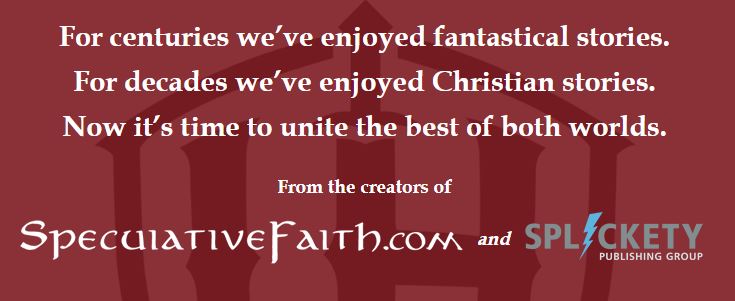You may never hear this. But I heard you clearly at the Realm Makers 2017 conference, during keynote speaker Ted Dekker’s question-and-answer session on Saturday, July 29.
In a room of 250-some-odd people, you took courage.
You stood and asked Ted Dekker for any help dealing with your struggles.
As I recall, you said you felt trapped in a particular culture: the culture of evangelical Christian homeschooling. You felt stifled. Maybe you felt spiritually abused. Your family and church didnât get your desire for adventure found in fantastic worlds and imagination.
I can only guess at what you didnât want to say. Maybe people have not only been confused by your love of imagination. Maybe they donât just say youâre weird. Maybe they say worse.
My heart went out to you. (And my wife felt the same!)
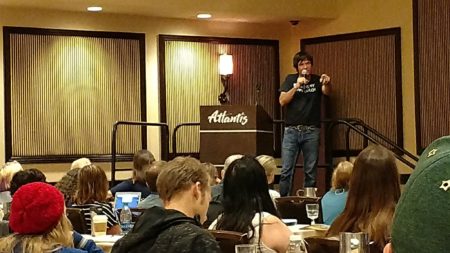
Ted Dekker speaking at the 2017 Realm Makers conference in Reno, Nevada.
What I wish I could have said
I love Jesusâs church. Thatâs His bride, and He loves her. And I also love homeschooling!
But. I understand when people associate these good gifts with pain and even evil.
Imagine youâve heard the most beautiful music in the world. Imagine your favorite voice(s), themes, and genres, all at the top of their art form. Imagine you love to listen.
Now imagine, each time you listen, someone comes up from behind you and slaps you.
Every time. Youâre trying to listen to beautiful music. Every time. Someone slaps you.
Before too long, what would happen?
The beauty would turn ugly. The vocalistâs songs would mock you. The musicians would play on. They wouldnât care that in your world, their good artistry is paired with your pain.
Thatâs how it feels when weâre trained to associate Godâs good gifts with pain and abuse.
Sometimes we train ourselves to do this.
Sometimes other people train us. They may mean well. Or they may be actual bad guys.
Jesus has plenty of warnings for everyone (not just obvious religious hypocrites). But He often warned against leaders who twist Godâs good laws (Matthew 23, Mark 7). Jesus said:
They tie up heavy burdens, hard to bear, and lay them on peopleâs shoulders, but they themselves are not willing to move them with their finger.
The apostle Paul warned about men who spread particular false teaching among Godâs people (1 Timothy 4:1-5). These false teachers donât want us to be âmore like the world.â They arenât trying to get us to be pagan feminists or atheists. In fact, these false teachers preach against good things in the world God has given us, such as marriage and foods!
Godâs gift of imagination and fantasy
Today, even some well-meaning Christians teach against good things. SpecFaith readers know Godâs good gifts include the gifts of human culture and human imagination.
In short: God wants us to imitate His creativity. He made an amazing, fantastical world with an epic plot (starring Himself as the Hero versus the villain of human and demonic evil).
So any time we imagine and create, we intentionally honor God as Creator.
When we enjoy good use of our imaginations, we worship our King.
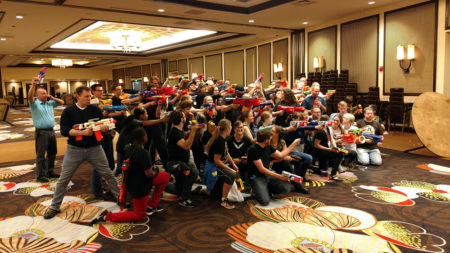
Realm Makers 2017 guests could worship God through play during the conference’s Saturday night Nerf war.
Thatâs a very Christian-y word: worship. I think many Christians misunderstand this word to refer only to music or preaching, family values, and other church-y things. Thatâs what I used to assume. Then I found a whole body of truth that Christians have taught. Some call it the âdoctrine of vocation.â It says that everything good we do, we can do to glorify God.
Even imagination. Even local churches. Even Nerf wars.
Hey, that sounds biblical. Almost like the apostle Paul again:
Whatever you do, work heartily, as for the Lord and not for men, knowing that from the Lord you will receive the inheritance as your reward. You are serving the Lord Christ.
Stay in a great local church
I donât know if people in your family or church are preaching against these good things.
In fact, it would be a mistake for me to assume they are. Everyoneâs story is different.
And because Iâm a man, I also canât pretend to understand how you may feel.
But I can tell you this: if youâre struggling now, in Christ, it does get better.
Time doesnât heal our wounds. But Jesus does. And He heals them by taking us out of our slavery and redeeming those good gifts that people have abused for evil ends.
He gives us food, marriage, family, churches, imagination, and most of all Himself.
Some people canât enjoy these gifts, listening to Godâs âmusic,â without feeling pain.
In my case, I literally felt some pain at the word âfamily.â Thatâs how bad things became.
But Jesus is a wonderful, redeeming Savior. And He loves every sinner. Including sinners who have suffered under other sinners. â⊠A bruised reed he will not break, and a faintly burning wick he will not quench; he will faithfully bring forth justice.â
And thanks be to God, Jesus doesnât stop at redeeming us.
He also helps us redeem good gifts that we have trained to associate with evil and pain. He can help us redeem fantasy, imagination, music, the Bible, family, and even the local church.
So run to Jesus: the Jesus of the Bible, the Hero whom real, Jesus-loving local churches have been sharing and following for centuries. He is true and good and beautiful. And so are the good saints who have loved and obeyed Him all this time. These good saints do exist. They love Jesusâs love, His teaching, and His local churches (flawed though they are!).
A good church needs you. People need your story. And you need them and their stories.
Mostly, youâll need more of Jesus, whom our good churches love and obey. And you need the good gifts Jesus made available through His brothers and sisters in a good local church: gospel teaching, love from spiritual family, the Lordâs supper, baptism, and worship.
Seek the promised land
Does this all sound unbelievable? Iâm sure it might.
All I know is that, in my case, when I felt trapped in a strange land, I lived for real accounts and stories of other, better worlds. They helped me find Jesus, and find His good people.
No, those worlds werenât idyllic. Narnia has nasty Calormenes. Even good local churches have hypocrites. But these worlds were still better anyway. You could join other people like you. You could become stronger and freer to follow heroes and fight enemies.
 Thatâs why I love Realm Makers. Itâs not a church! But itâs a âworldâ of Christians who get both biblical truth and fantastic stories. Itâs a foretaste of Jesusâs âpromised land,â the New Heavens and New Earth (Revelation 21). Jesus has promised that someday, after all our hypocrisy, abuse, evil, and temptations, He will make all things new. He will unite Godâs world, New Heavens, with a perfect remodel of this planet, New Earthâa world of imagination and love and adventure under King Jesus. (And imagine: Nerf battles galore.)
Thatâs why I love Realm Makers. Itâs not a church! But itâs a âworldâ of Christians who get both biblical truth and fantastic stories. Itâs a foretaste of Jesusâs âpromised land,â the New Heavens and New Earth (Revelation 21). Jesus has promised that someday, after all our hypocrisy, abuse, evil, and temptations, He will make all things new. He will unite Godâs world, New Heavens, with a perfect remodel of this planet, New Earthâa world of imagination and love and adventure under King Jesus. (And imagine: Nerf battles galore.)
So itâs not all empty promises.
Jesus put reflections of this perfect world even into this terrible world. In His mercy, He lets us find these places here. He helps us feel joy, not pain, associated with His good gifts.
I hope you found Him at Realm Makers last week.
Anyway, Iâve gone on long, for you and anyone else happening by. That was intentional.
But back when I was hurting, I lived for long stories from people whoâd been where I was.
If you want to connect, comment below, or find me on Facebook.
May God bless and keep you.
 We know heâs bold because they tell us heâs bold, and also because he recommended the phenomenally bold course of sailing to the Island where Dreams come true (though here I am using âboldâ in the sense of âstupidâ). Reepicheep talked incessantly of honor and his sword, though his only known uses of the sword were to beat a coward and stab Telmarines in the foot. His habitual threats of violence thus rang hollow. But everyone took him as a paragon of valiance and courage, and by the end of Voyage of the Dawn Treader, it was all rather too much.
We know heâs bold because they tell us heâs bold, and also because he recommended the phenomenally bold course of sailing to the Island where Dreams come true (though here I am using âboldâ in the sense of âstupidâ). Reepicheep talked incessantly of honor and his sword, though his only known uses of the sword were to beat a coward and stab Telmarines in the foot. His habitual threats of violence thus rang hollow. But everyone took him as a paragon of valiance and courage, and by the end of Voyage of the Dawn Treader, it was all rather too much.































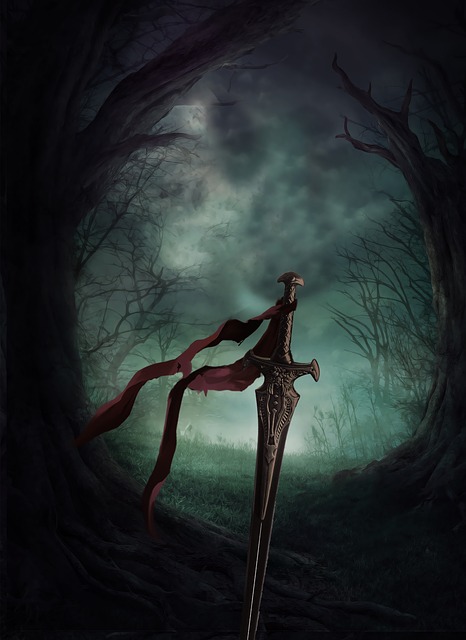
 Sometimes its edgy. The hero isnât a compliant teenager who memorizes Bible verses for a living and has a crush on the pastorâs daughter (which we never really see develop because appropriate boundaries).
Sometimes its edgy. The hero isnât a compliant teenager who memorizes Bible verses for a living and has a crush on the pastorâs daughter (which we never really see develop because appropriate boundaries).

 We also started the
We also started the  which intends, among other things, to create book clubs among Christians in churches. I’m not sure “come join our geekiness” will win a lot of people to such an endeavor. I could be wrong (it wouldn’t be all that unusual!), but I wonder if there aren’t other readers out there who are simply readers who might be interested in a book club whether the chosen titles are speculative or not. After all, they might be like me and not necessarily feel as if they have the necessary “admirable level of knowledge, expertise, and passion” to be considered a speculative fiction geek.
which intends, among other things, to create book clubs among Christians in churches. I’m not sure “come join our geekiness” will win a lot of people to such an endeavor. I could be wrong (it wouldn’t be all that unusual!), but I wonder if there aren’t other readers out there who are simply readers who might be interested in a book club whether the chosen titles are speculative or not. After all, they might be like me and not necessarily feel as if they have the necessary “admirable level of knowledge, expertise, and passion” to be considered a speculative fiction geek.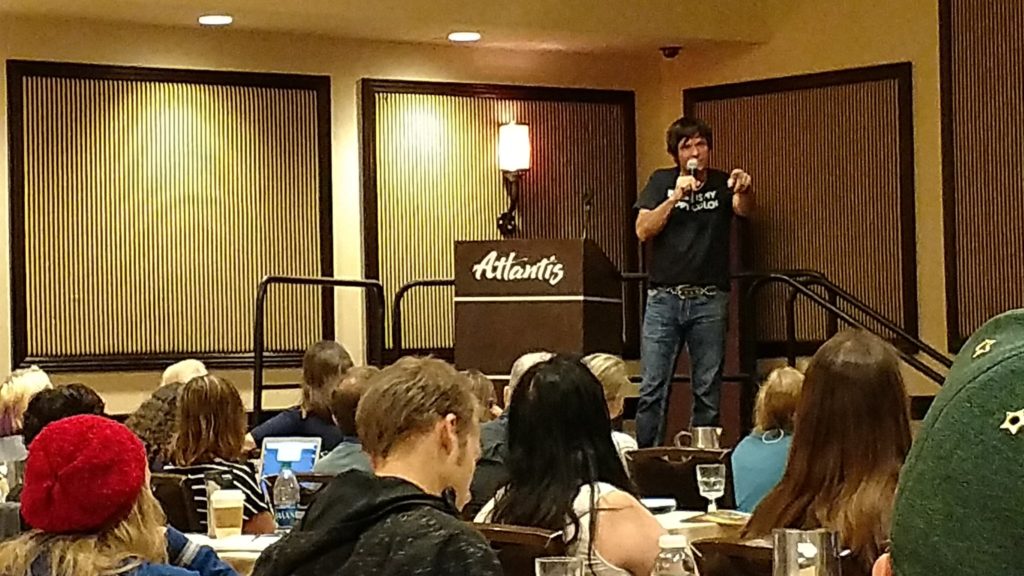


 Thatâs why I love
Thatâs why I love 




 As Christian groups go, our little gathering of fantastical writers and fandom-loving people earns a reputation of being unique, strange, and definitely in the minority. That said, since the
As Christian groups go, our little gathering of fantastical writers and fandom-loving people earns a reputation of being unique, strange, and definitely in the minority. That said, since the  This sense of community leads to a distinct camaraderie. Having been to Realm Makers the previous three years, I can say itâs one of the few places where Iâve thought, âThese are my people!â
This sense of community leads to a distinct camaraderie. Having been to Realm Makers the previous three years, I can say itâs one of the few places where Iâve thought, âThese are my people!â As Christians who know the Truth, and as spec-fic writers who can explore this Truth in beautiful, compelling ways, weâre uniquely positioned.
As Christians who know the Truth, and as spec-fic writers who can explore this Truth in beautiful, compelling ways, weâre uniquely positioned.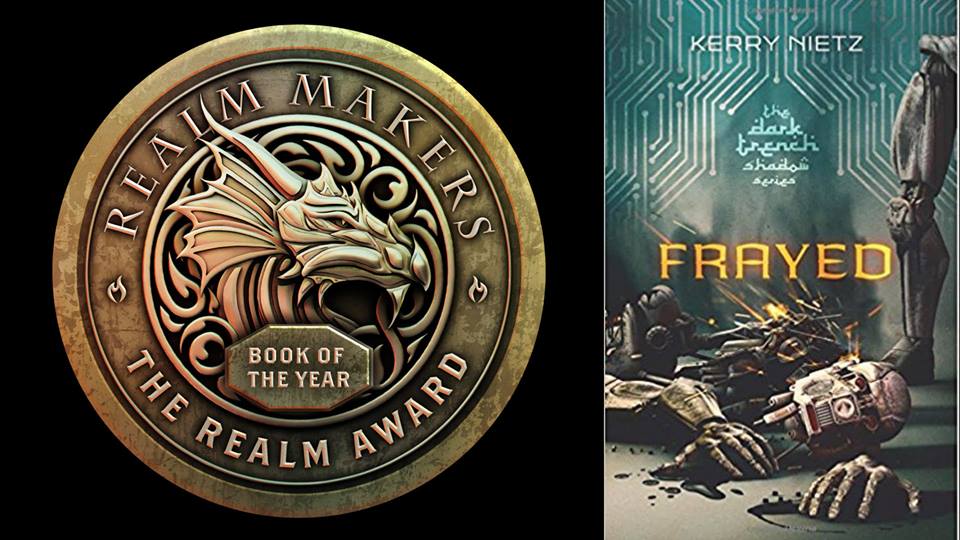
 Frayed by Kerry Nietz
Frayed by Kerry Nietz
